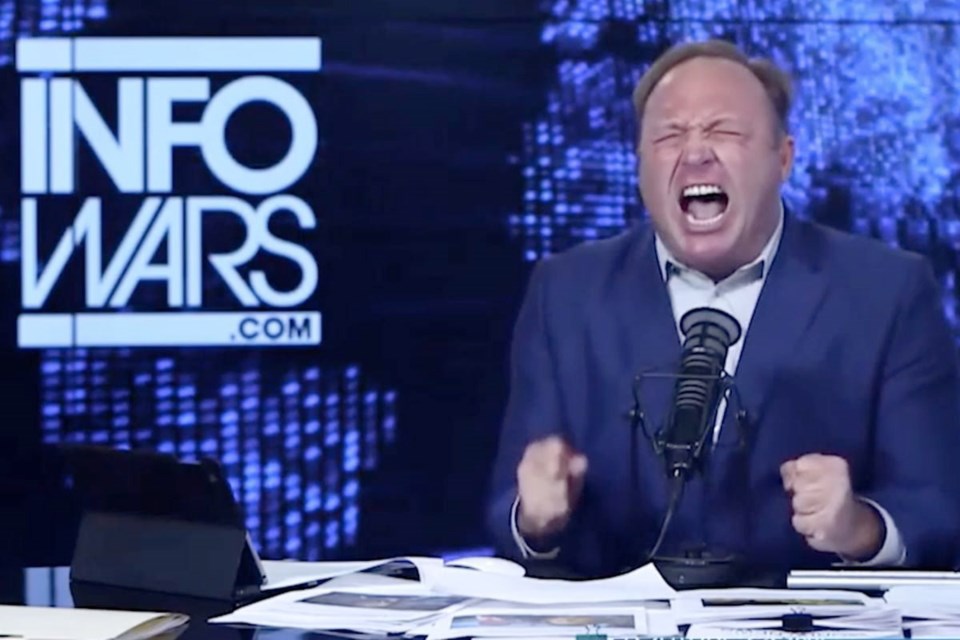Facebook is removing the accounts, fan pages and groups affiliated with individuals such as Alex Jones.
This might be too little, too late. Jones adamantly states, with no fear of contradiction, that among other things, the Sandy Hook school shootings were not real and were staged by “crisis actors.”
What ludicrous nonsense, you say. Who could believe that? Obviously someone, because Jones’ Infowars site claims more than four million followers and is growing rapidly. More since Facebook booted him.
Not my people, you say, until you realize that the same Facebook your kids consult every day, along with other social-media sites — such as Instagram, Snapchat, YouTube, LinkedIn, Twitter or Pinterest — form a significant role in users’ understanding of the world around them.
But how influential can a social-media site such as Facebook be? Again, consider the fact that, by its own count, Facebook has two billion monthly users. As of January 2016, 100 million hours of video was watched on Facebook daily, and every 20 minutes one million links are shared, 20 million “friend” requests are sent and three million messages are sent.
Facebook is available in 101 languages.
“We’ve always banned individuals or organizations that promote or engage in violence and hate, regardless of ideology. The process for evaluating potential violators is extensive and it is what led us to our decision to remove these accounts today,” Facebook said in a statement.
Facebook has been under massive pressure globally to curtail the ways in which its platform is used to circulate hate by groups and individuals. Most recently, after massacres in Sri Lanka and New Zealand in which the perpetrators used social media to spread their outlandish, hate-filled messages.
So far, so good, but the good ship “Social Media Responsibility” sailed years ago and then sank without a trace, leaving only a nasty oil slick.
Devin Kelley, 26, who shot up a church in Sutherland Springs, Texas, had posted his “manifesto” on Facebook. Kelley, who killed 26 churchgoers and wounded 20 others, was a militant atheist who ranted to his Facebook followers about “stupid” religious people.
Other shooter/mass murderers have also had their philosophies traced back to social media.
“Hate speech” has been described as the “new pornography,” and is characterized by a variety of definitions, which include the notion that the speaker intends to offend, insult, intimidate or threaten an individual or group based on sexual orientation, religion, race, nationality, gender or disability.
George Lakoff, retired distinguished professor of cognitive science and linguistics at University of California Berkeley, wrote in his 2017 commentary “Why Hate Speech is Not Free Speech” that: “Like violence, hate speech can also be a physical imposition on the freedom of others. That is because language has a psychological effect imposed physically — on the neural system, with long-term crippling effects.”
Lakoff proposed that hate speech intends to inflict restrictions on the freedom to think and act free of fear, threats and distrust. That, he suggests, is why hate speech is not “mere” or “free” speech, since its intention is to impose on the freedom of others.
Words matter, and the fact is, especially in an age of 24/7 news, the spoken or written word throughout history has always held the power to support or shatter belief systems, and continues to do so today.
Demagogues, once limited to the public podium, understand this and have always demonstrated the capacity not only to affect hearts and minds for better or worse, but to exercise influence through Twitter, Facebook and other technological platforms where entire subcultures come to believe “alternative truth” despite all evidence to the contrary.
Tub-thumpers, manipulators and even the best orators throughout history have always grasped the power of succinct vocabulary and economy of expression, which can, and have, changed the course of history for entire nations.
When Churchill was asked to explain his policy about Nazism, he replied: “It is to wage war against a monstrous tyranny, never surpassed in the dark, lamentable catalogue of human crime — that is our policy.” Clear enough, no words wasted.
Even the ideological enemies of Adolf Hitler admit that he was a gifted and prolific speaker: “Words build bridges into unexplored regions,” he said ominously, and millions hung on his words, which advocated the destruction by any means not only of the Jewish people, but of entire neighbouring nations.
Lakoff, in his commentary, observes that hate speech can galvanize the thinking of those with only an existing mild prejudice, moving bigotry toward hate and, subsequently, action.
“When hate is physically in your brain, then you think hate and feel hate, you are moved to act to carry out what you physically, in your neural system, think and feel,” he writes.
As comedian/social philosopher Robin Williams put it: “No matter what people tell you, words and ideas can change the world,” and these days, as never before, our kids are being flooded with words and ideas.
Geoff Johnson is a former superintendent of schools.



